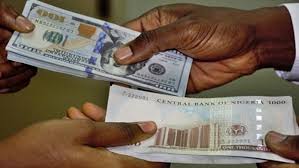The naira traded at ₦1,548.52 to one US dollar on the official Central Bank of Nigeria (CBN) window as of June 23, 2025, reflecting continued pressure on Nigeria’s foreign exchange market. According to data from the CBN and other market monitoring platforms, the exchange rate on the official market ranged between ₦1,545 and ₦1,551 per dollar.
However, in the parallel market, popularly known as the black market, the exchange rate was much higher. The dollar exchanged for between ₦1,585 and ₦1,600, averaging about ₦1,592.50 on June 24. This shows a difference of about ₦44 between the official and parallel market rates, a development that many financial analysts say reflects the persistent challenges in Nigeria’s foreign exchange system.
Throughout the month of June 2025, the naira has shown relative stability at the official window, with only minor fluctuations. In May 2025, the naira even appreciated slightly, gaining about 1.28 percent against the dollar. Market watchers say the small gains were due to improved dollar supply and increased intervention by the Central Bank of Nigeria.
Exchange rate data from early 2025 shows that the naira has traded within a wide range since the beginning of the year. In February, the currency dipped to a low of ₦1,491 per dollar, while in May it reached a peak of ₦1,607, the highest level recorded this year.
Financial experts warn that the wide gap between the official and black-market rates is affecting investor confidence and could lead to increased currency speculation. Businesses, importers, and ordinary Nigerians are feeling the heat as the cost of goods and services continues to rise, driven by expensive dollar rates in the open market.
Traders at popular foreign exchange spots in Lagos, including Allen Avenue in Ikeja and Wuse Zone 4 in Abuja, confirmed that the dollar was selling above ₦1,590 as of Monday, June 24. They said the high demand for dollars by importers and students studying abroad, combined with limited supply from official sources, was keeping the price high in the black market.
Banks and financial institutions continue to rely on the official rate for regulated transactions, including payments for medical expenses, school fees, and travel allowances. However, individuals and businesses who cannot access forex at the official rate are forced to turn to the parallel market, where rates are significantly higher.
The Central Bank has maintained that it is working to stabilise the foreign exchange market through various reforms, including unifying the exchange rate system and removing bottlenecks in the forex supply chain. The apex bank has also continued its clampdown on illegal bureau de change operators and forex speculators.
Earlier this year, the Minister of Finance and Coordinating Minister for the Economy, Wale Edun, stated that the Tinubu administration’s reforms were yielding positive results in the forex market. He said the difference between the official and parallel market rates had reduced significantly compared to the previous year, though current data shows the gap remains wide.
The spread between the two markets is a major concern for economists, who argue that it creates room for arbitrage and distorts pricing in the economy. They are calling on the CBN to ensure increased transparency, boost forex reserves, and encourage more inflows through foreign direct investments and non-oil exports.
Many Nigerians who depend on imported goods are worried about the impact of rising dollar rates on inflation. The price of essential items like fuel, pharmaceuticals, electronics, and industrial materials continues to climb, making life harder for ordinary citizens.
With the naira trading within a volatile range of ₦1,491 to ₦1,607 in 2025, experts say Nigeria needs stronger fiscal and monetary coordination to manage its currency and protect the economy from further shocks. Exchange rate stability, according to them, is critical to attracting investment and keeping inflation in check.
As it stands, Nigerians are closely watching the forex market and hoping that the government’s ongoing reforms will eventually bring lasting relief to the currency and economy.
